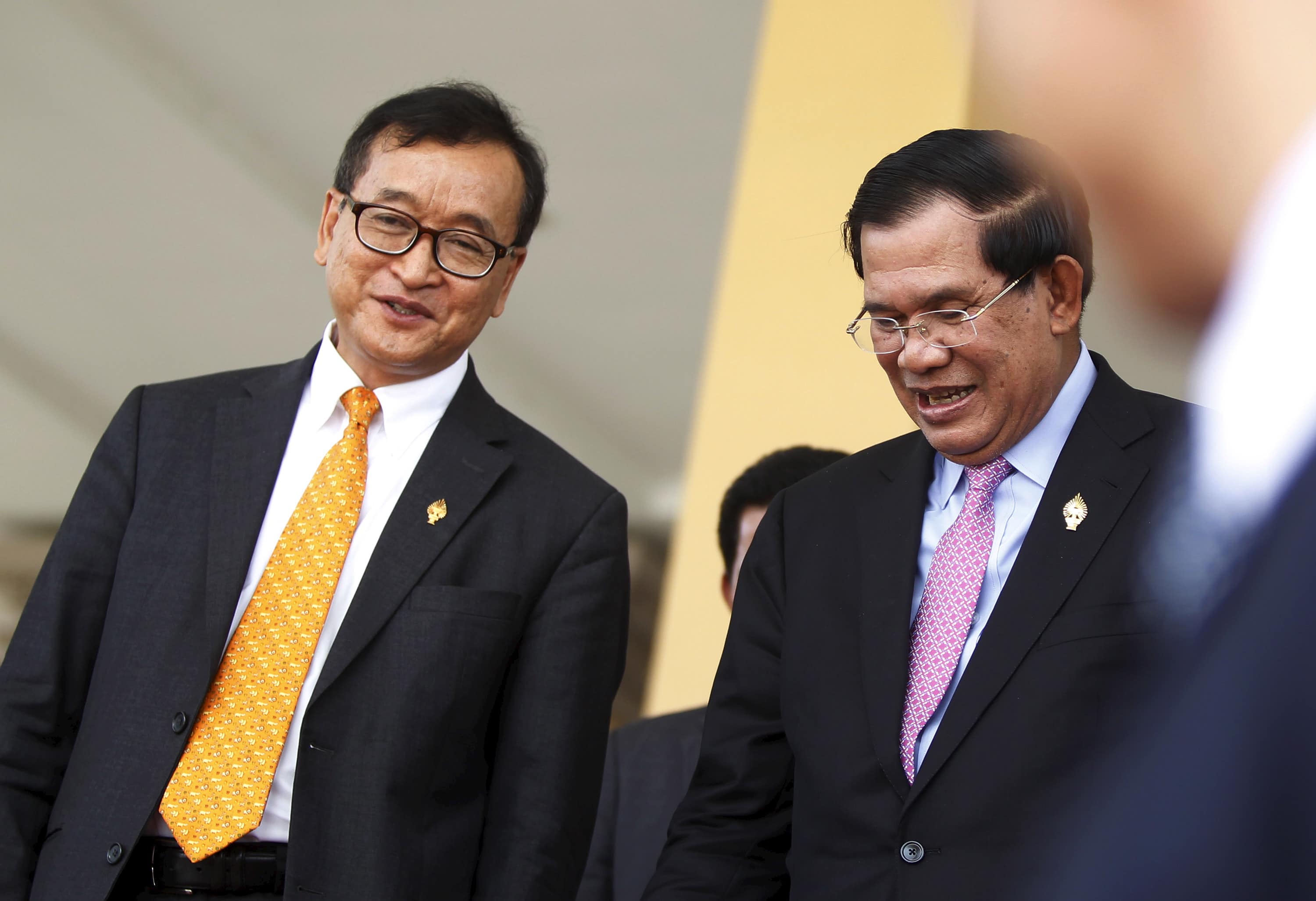The Phnom Penh municipal court issued an arrest warrant for Cambodian National Rescue Party ("CNRP") President Sam Rainsy, in what was clearly a politically motivated move. This is the latest in a series of actions taken against the political opposition, which violate both the Constitution of the Kingdom of Cambodia and international human rights standards.
This joint statement was originally published on cchrcambodia.org on 16 November 2015.
CSOs condemn opposition crackdown and express concern over threats to democracy
We, the undersigned civil society organizations (“CSOs”) condemn the severe crackdown which is being undertaken by the Royal Government of Cambodia (“RGC”) against Cambodia’s political opposition, along with the absolute control of the judiciary being exercised by the RGC in order to harass its opponents.
On Friday, 13 November 2015, the Phnom Penh municipal court issued an arrest warrant for Cambodian National Rescue Party (“CNRP”) President Sam Rainsy, in what was clearly a politically motivated move. On Monday, 16 November, the opposition leader was stripped of his position as a member of the National Assembly (“NA”) by the NA’s standing committee, who used the arrest warrant as justification.
This development is the latest in a string of arrests, convictions, threats, and beatings orchestrated by the RGC against the political opposition in recent months. This crackdown represents a major threat to democracy and fundamental freedoms in the Kingdom of Cambodia.
The arrest warrant issued on Friday relates to a defamation conviction that was handed down in 2011, arising from a statement allegedly made by Sam Rainsy in 2008. The sudden reappearance of an arrest warrant for this conviction, more than 7 years after the alleged incident, coincides with numerous threats of legal action against Sam Rainsy that have been issued by Prime Minister Hun Sen in recent weeks. The issuing of this warrant has clear political motivations and provides yet another example of the RGC’s control over the Cambodian judiciary, which it continues to use as a tool to stifle dissent in Cambodia.
This development is the latest in a series of actions taken against the political opposition by the RGC, which violate both the Constitution of the Kingdom of Cambodia and international human rights standards. On 26 October 2015, police failed to prevent the brutal assault of two opposition lawmakers, Nhay Chamreoun and Kong Sophea, outside the national assembly by members of the ruling Cambodian People’s Party (“CPP”), amid strong evidence that the attack was facilitated or organized by senior figures. On 15 August 2015, opposition Senator Hong Sok Hour was arrested and detained – despite holding immunity from arrest – for posting a fake border treaty on Facebook. He remains in detention. Previously, on 21 July 2015, 11 CNRP activists were sentenced to imprisonment ranging from 7 to 20 years by the Phnom Penh Municipal Court, in connection with protests that erupted in July 2014 at Phnom Penh’s Freedom Park. The trials were based on trumped-up charges and characterized by a total disrespect for fair trial rights. These examples make a mockery of the principle of judicial independence and the universal human right to a fair trial.
This opposition crackdown stands in sharp contrast with recent events in nearby Myanmar – where autocratic rule is making way for the development of democracy. In Cambodia, on the other hand, democracy is being steadily and intentionally eroded. True democracy requires full respect for the rights to peaceful assembly, expression, and association, as well as a genuine separation of powers and respect for the rule of law. The issuing of this warrant is a clear violation of the principle of judicial independence and the separation of powers. As our neighbours in Myanmar make the transition to democracy, it appears that Cambodia’s political leaders are intent on shutting democracy down at home. The systematic, unconstitutional targeting of opposition lawmakers is deeply undemocratic and in complete conflict with international human rights standards.
We, the undersigned CSOs, call upon the Royal Government of Cambodia to refrain from exercising political control over the judiciary, to depoliticize the courts system, and to allow democracy to flourish in Cambodia.
We further call upon the CPP and CNRP, and the supporters of both parties, to remain calm and to refrain from engaging in violence of any kind as the political situation deteriorates.
Finally, we call upon the international community and Cambodia’s donors to exert pressure upon the RGC to resolve Sam Rainsy’s case through peaceful negotiation, and to end the practice of using the courts to clamp down on the political opposition.
This joint statement in endorsed by:
The Alliance for Conflict Transformation (ACT)
Cambodian Center for Human Rights (CCHR)
(The) Committee for Free and Fair Election in Cambodia (COMFREL)
Cambodian Food and Service Workers Federation (CFSWF)
Cambodian Human Rights and Development Association (ADHOC)
Coalition for Integrity & Social Accountability (CISA)
Cambodian Independent Teachers Association (CITA)
Cambodian Labour Confederation (CLC)
Coalition of Cambodian farmer Community (CCFC)
Equitable Cambodia (EC)
Gender and Development for Cambodia (GADC)
Independent Democratic Association of Informal Economic (IDEA)
Housing Rights Task Force (HRTF)
Indradevi Association (IDA)
Khmer Youth Association (KYA)
People Center for Development and Peace (PDP-Center)
Ponlok Khmer
Samakum Teang Tnaut (STT)
Strey Khmer Organization (SK)



